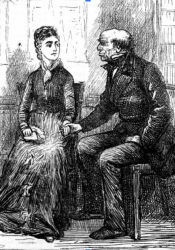Altick & Dickens in Conversation (Anne)
- The Rise of the Library and the Greed of Publishers → Art as Commodity in Hard Times
Altick describes the importance of accessibility in the eyes of the authors themselves. He writes, “Often it was the author, rather than the publisher, who had to take the initiative in getting out a cheap reprint. Only when John Stuart Mill, moved by frequent pleas from workingmen, offered to forego his half-share of the profits, did [his publisher] agree to issue a cheap People's Edition of his works” (298). Mill struggled to make his work accessible for all. Even though the new publications were sold to libraries, Mill proves that authors still wanted their novels to be owned by anyone. As a contemporary of Dickens, he must have had similar concerns. In Hard Times, Dickens explicitly mentions this issue of accessibility and the business of libraries. Gradgrind says, “There was a library in Coketown, to which general access was easy. Mr. Gradgrind greatly tormented his mind about what the people read in this library . . . It was a disheartening circumstance, but a melancholy fact, that even these readers persisted in wondering . . . about human nature, human passions, human hopes and fears, the struggles, triumphs and defeats, the cares and joys and sorrows, the lives and deaths of common men and women!” (Book I, Ch. VIII). Dickens refers to the business of libraries and Gradgrind’s system of a transactional education in the same passage to equate the concepts. Art, in this case books, has become a basic product to be bought and sold which takes out some of the “wonder.” The rise of the library business spawned by the greed of publishers touched authors like Dickens and Mill deeply.
This image depicts Gradgrind trying to comfort Louisa the morning after she stands up James.

